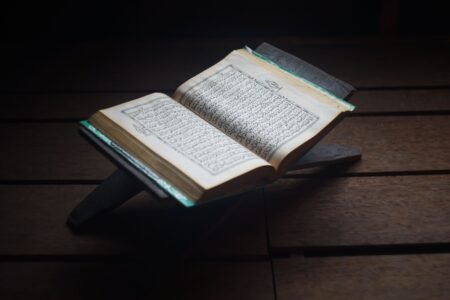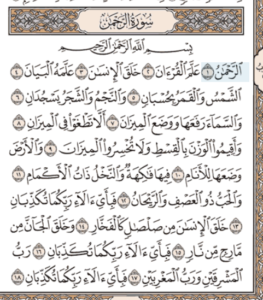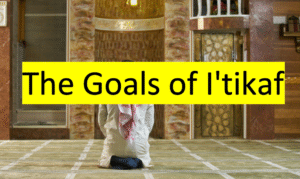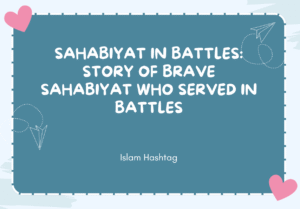Lesson/Notes from Surah Rahman.
Surah Rahman is one of the Surah that lifts up my heart and makes me ponder in the blessings of Allah.As a child I used to listen to my father reciting Surah Rahman and get overjoyed.
Surah Rahman emphasizes Allah’s abundant favors to both mankind and Jinn, which benefit us in this world and the hereafter. A distinct feature of this Surah is the verse, “So which of the favors of your Lord will you deny?” repeated 31 times. This repetition enhances the Surah’s rhythm and meaning, reminding us to acknowledge and be grateful for Allah’s blessings.
This is an independent website by a Female scholar.If you benefit from our articles, Help our Projects by buying our Worksheets (Link1) or (Link2) or removing ads. Bookmark our website so that you can visit it daily for(Digital Tasbih) or (Salah Tracker).
Key Themes and Blessings in Surah Rahman
- Divine Knowledge and Creation
Allah opens the Surah with, “Ar Rahman (The Most Merciful) taught the Quran.” The Quran is a great blessing, teaching us words, meanings, and eloquence, making it easy to memorize. Through it, mankind—who is but a being of blood and flesh—can hold Allah’s words in their heart.“He created man and taught him to speak,” further emphasizes that Allah granted us knowledge and the ability to articulate thoughts and ideas in various languages, enriching our expressions and understanding. - The Balance in Nature
Allah speaks of the sun and moon orbiting in calculated paths, symbolizing divine order in the universe. “The creeper and the tree prostrate,” suggests all creations naturally submit to Allah. The balance extends to human interactions as well, with a call for fairness in weights and measures. - Earth’s Provisions
Allah has designed the earth to support life, making it suitable for building, planting, and sustaining infrastructure. The earth’s produce includes fruits and date palms with sheathed stalks that protect and benefit us in multiple ways. - Creation of Man and Jinn
Man is created from clay and Jinn from fire, signifying diversity in Allah’s creations. The simple act of creation is a profound blessing, allowing us to experience life and benefit from Allah’s countless gifts. - The Seas and Oceans
Allah mentions the meeting of fresh and saltwater with a barrier between them, signifying a unique design in His creations. From the sea, we derive food, jewels, and means for transportation, all of which are immense favors from Allah. - The Transience of Creation
“Everything on earth shall perish, only the countenance of your Lord…shall remain.” This verse reminds us that everything will eventually cease except Allah, the Everlasting.
Lessons from the Verses
1. Divine Teachings and the Qur’an as a Mercy
- Verse: “The Most Merciful taught the Qur’an.”
- Reflection: Allah’s mercy is epitomized through the gift of the Qur’an. He has not only given humans a guide but also the intellect and ability to comprehend its message. It’s a blessing that can transform lives and lead to salvation.
- The Role of Language and Expression: Allah further emphasizes His gifts by mentioning He has taught humans eloquent speech, a tool for communication, learning, and worship.
2. Natural Order and Precision in Creation
- Verses: “The sun and moon (orbit) according to a precise calculation.”
- Reflection: Allah points to the celestial order as a sign of His wisdom. Every planet, every celestial body, moves in perfect synchronization, showing His power and precision.
3. Life-Sustaining Provisions and Justice
- Verse: “He raised the sky and set the balance so that you do not transgress the balance.”
- Reflection: The universe operates on balance. Humans are urged to uphold justice and fairness in dealings, especially in measurements and weights, echoing the natural order Allah has created.
4. Blessings on Earth
- Verses: “He laid the earth for His creatures, with fruits and palm trees with sheaths.”
- Reflection: Allah’s mercy manifests in the fertile land, producing food, water, and resources essential for life. The diversity in food sources and materials reflects His generosity in sustaining us.
5. Creation of Man and Jinn
- Verses: “He created man from clay like pottery, and created the jinn from a smokeless flame of fire.”
- Reflection: The distinction in creation materials signifies unique roles and capabilities. Human life, as created from earth, symbolizes connection to the material world, while the Jinn, created from fire, possess a different nature and purpose.
6. Oceans and Barriers between Waters
- Verse: “He released the two seas, meeting side by side, with a barrier between them they do not transgress.”
- Reflection: Allah highlights the boundary between freshwater and saltwater as a sign of His control. Despite their proximity, they do not merge, serving as another wonder of creation.
7. Jewels and Wealth from the Sea
- Verses: “From both of them come forth pearl and coral.”
- Reflection: Jewels extracted from the sea, like pearls and coral, are not only sources of beauty but signify Allah’s provision of wealth and adornment, treasures that add to human enjoyment.
8. Honoring Humanity
- Verse: “We have indeed honored the children of Adam.”
- Reflection: Humanity is honored above many of Allah’s creations, given intellect, purpose, and responsibility. Believers are encouraged to honor this blessing by fulfilling their divine obligations.
9. Paradise and Rewards for the Righteous
- Verse: “For the one who fears the standing before his Lord, there will be two gardens.”
- Reflection: Allah describes Paradise with lush gardens, springs, and abundant fruits. The reward for revering Allah and following His path is an eternal abode filled with unimaginable delights.
10. Majesty and Benevolence of Allah
- Verse: “Blessed is the name of your Lord, Owner of Majesty and Honor.”
- Reflection: The Surah ends by glorifying Allah’s majestic and noble nature. Reciting this brings about blessings, as Rasul Allah sallalahu alaihe wa sallam advised believers to include “Dhul Jalali wal Ikram” in their supplications.
The opening verses of Surah Rahman make mention of such bounties that feed one’s Belief,soul .and body. Allah begins by saying, “Ar Rahman (The Most Merciful) taught the Quran.” The Quran is an extremely great bounty of Allah to mankind. Allah taught man the words of the Quran, the meanings of the verses and has also allowed man to understand the eloquence and rhetoric of the Quran. In addition to this, Allah has also made it easy for man to memorise the Quran. Man, who is merely an entity filled with blood, is extremely honoured to be able to contain the speech of Allah in his bosom and to speak it with his tongue. Hundreds of thousands and millions of books have been written containing explanations of the Quran and this practice will continue until Judgement day.
Allah continues to says that “He created man and taught him to speak.” Allah granted man knowledge, granted him the ability to speak and even taught him how to utilise this ability. Man can thus express what he feels and thinks. Allah Taala has also taught man how to speak eloquently and how to explain the meanings of the Quran. Not only did Allah teach people speech, but He taught man various languages and manners of expression. Man is also able to translate from language to language.Allah then speaks of the solar and lunar orbits when he says, “The sun and moon (orbit in) calculated courses.
Furthermore,Allah says “the creeper and the tree prostrate.” Just like worshippers are pleased to prostrate before Allah out of obedience to Him, so too are all of Allah’s creation pleased to obey Him, including those plants that have an upright trunk and those that creep and have no rigidity. Allah then speaks of the sky when He says that He “raised the sky “.It is Allah Who raised the sky to its towering height.
Allah Taala cautions man not to demand extra in weight when dues are given to him and not to reduce weight when payment is due from him.The command to be just in weight and measurement is also mentioned in Surah Anam [Surah 6, verse 152] where Allah commands: “And give full measure and weight in fairness.”
Furthermore Allah says that He “has placed the earth for people.” Allah Taala has made the earth such that it is neither too hard nor too soft. People are able to dig the earth to create dams, wells, graves, plant plantations and lay the foundations of their buildings. At the same time, the earth can support man’s structures, carry his railroads and highways and the beating hooves of his animals.
Allah then enumerates the various benefits that the earth gives to mankind when He says that the earth has fruit (and) palms with sheathed stalks” Allah has covered the stalks of such plants so that the fruit are protected and also because these coverings may be used for a variety of purposes. In addition to this, Allah has also created “seeds as chaff. This verse refers to cereals like wheat, barley, etc which are like little seeds that provide ample nourishment for man.
Man in general is created from sand and that the Jinn are created from fire because their fathers were created from these substances. The blessing of being created and granted life is an extremely great bounty without which many other bounties cannot be enjoyed. Because Allah has granted these many favours to mankind and to Jinn, it is incumbent on them to be grateful to Him. Allah reminds them of this when He states “So which favours of your Lord do the two of you (man and Jinn) deny?”
Allah then speaks of the oceans when he says, “He has released the two waters so that they meet. Between the two (waters) is a barrier so that the two do not transgress.”Although two types of water bodies seem to be one to the onlooker, they are actually separated by an invisible barrier. In this way, the salty water and fresh water never mix. Man and Jinn derive various benefits from the two types of water and therefore are obliged to express gratitude to Allah. Allah reminds them of this when He says, “So which favours of your Lord do the two of you deny?”
The various jewels that emerge from the sea are also a great favour from Allah and man and Jinn are required to be grateful to Allah for these. Allah Taala goes on to say that “His are the raised ships on the oceans like mountains.” These huge ships remain afloat only by Allah’s will. When waters get rough and strong winds blow, it is only Allah that protects the ship and those in the ship. Allah allows the large ships laden with hundreds of tons of cargo to traverse through the oceans so that man may transport goods from one continent to another.
Allah has inspired man to build ships and has granted him the expertise and capabilities to accomplish the task. Allah has also taught man how to navigate the oceans, how to load his shipping vessels and how to derive maximum benefit from this skill. The shipping trade caters for the needs of millions of people throughout the world. It is therefore incumbent on people to express their gratitude to Allah for this. Therefore, Allah reiterates, “So which favours of your Lord do the two of you deny?”
“Everything on earth shall perish.” Man, Jinn, fauna, flora, everything on land and everything at sea are all destined to perish when their lives have expired. When everything shall perish it will be “Only the countenance of your Lord the Possessor of majesty and benevolence (Who) shall remain. Allah says, “We have granted honour to the children of Adam.” However, for the disbelievers this honour is restricted to this world. As soon as they die.They will be made to suffer disgrace, which will perpetuate until eternity. In the Akhirah (Hereafter), the disbelievers will have neither honour nor favours,whereas the believers shall enjoy an abundance of both. “So which favours of your Lord do the two of you deny?”
Even the combined forces of man and Jinn cannot harness the power to transcend the limits of the heavens and the earth. Since man and Jinn are helpless in this very world, they will surely be powerless in the Akhirah (Hereafter) as well. It is therefore wishful thinking to believe that one will be able to escape Allah’s punishment because there is nowhere to hide. When Judgement day arrives, every person will realise the error of his ways. However, it will then be too late. It is a great favour from Allah that He has forewarned man and Jinn about this inevitable day. “So which favours of your Lord do the two of you deny?”
Allah then describes the horrors of Judgement day so that people may refrain from disbelief and become sincere Muslims.The guilty ones shall be forced to admit their misdeeds on the Day of Judgement and they will be unable to deny anything.the disbelievers will be deaf, dumb, blind and blue-eyed on the Day of Judgement. They will be recognised by these characteristics, “will be seized by their forelocks and feet” and cast into Hell. When they are thrown into Hell, they will be told, “This is Hell which the criminals used to deny.” They will thus be exposed to the worst forms of punishment.
After mentioning every bounty of the two gardens of paradise in the foregoing verses, Allah repeats the question: “So which favours of your Lord do the two of you deny?” Whereas the gardens of this world were described at the beginning of the Surah, the concluding verses describe the gardens of the Akhirah (Hereafter).Allah says, “The one who fears standing in the presence of his Lord shall have two gardens.” Although Heaven is itself an extremely large garden, there shall be several gardens within it, depending on the deeds of people.
Allah describes the two gardens by saying, “Both these (gardens) shall be filled with branches.” There shall be an abundance of green and lush branches in these gardens, indicating that they will be filled with an abundance of fruit. The second description states that “In both (gardens) there shall be two gushing springs.” In addition to providing refreshing water, the springs shall provide a scenic setting to watch.Allah describes the third characteristic of these gardens when He says,in both there shall be a pair of every fruit. The one type of fruit will be similar to what we see in this world while the other will be seen only in Heaven. Some commentators mention that the one type of fruit will be fresh while the other type will be dried. However, both will be equal in taste.
Further describing the bounties awaiting the righteous in Heaven, Allah speaks about their bedding and wives. Allah says, “The people (of Heaven) shall recline on bedding lined with thick silk.” This verse tells us that inner lining of this bedding will be made of thick silk. In this world, the outer lining of a bedding is usually decorated and made from material that is far more expensive than the material used for the inner lining.
The men of Heaven shall have their worldly wives in Heaven as well as wives from the “Hurain” These wives will be extremely beautiful and shall have eyes for none other than their husbands. Allah refers to this when he says, in these gardens there shall be maidens with lowered gazes”.
Allah states that the gardens of Heaven have “marvellous and stunning women.” Sayyidina Ibn Salamah -radi allahu anhu narrates from Rasul Allah sallalahu alaihe wa sallam that the women of Heaven are “marvellous” in character and “stunning” in beauty. Referring to the fact that these women will be reserved for their husbands, Allah states; “Fair damsels sheltered in tents.”Sayyidina Anas bin Malik (ra) reports that Rasul Allah sallalahu alaihe wa sallam said, “if a damsel of Heaven has to peek into this world, she would illuminate the atmosphere between the sky and the earth and fill it with her fragrance. It is a fact that the scarf on her head is more valuable than the earth and all its contents.” [“Mishkat” p. 495 from Bukhari]
Reminders:
Gratitude: Denying Allah’s favors can occur through neglecting to acknowledge blessings or using them in ways that displease Him. True gratitude requires both verbal appreciation and responsible use of Allah’s gifts.
Justice as a Favor: Allah’s warnings, even about punishment, are in themselves a mercy. By being informed of consequences, believers are granted the opportunity to correct their paths, a subtle yet profound favor in itself.
Responsibility of Worship: Both humans and Jinn were created to worship Allah alone (Surah Dhariyat, verse 56). This shared responsibility emphasizes the universal duty to live in devotion and gratitude.
Note 2
Allah addresses both humans and Jinn with the verse “So which of the favors of your Lord will you deny?” Sayyidina Jabir radi allahu anhu narrates that when Rasul Allah Sallalahu alaihe wa sallam recited Surah Rahman to his companions, they listened silently. Rasul Allah Sallalahu alaihe wa sallam remarked that, when he recited this Surah to the Jinn, they were more responsive, replying, “We do not deny any of Your favors, O our Lord. All praise belongs to You” (Tirmidhi).
Recognizing Allah’s blessings means acknowledging His favors and using them to please Him. Denial occurs when one attributes achievements solely to one’s efforts or acts as though Allah’s favors were not received.
Note 3
Why is the verse repeated even after mentions of punishment? Allah’s warning about consequences for wrong actions is, in itself, a mercy. By highlighting punishments, He encourages people to avoid paths leading to harm. This forewarning reflects Allah’s kindness, as He guides people to avoid sin and seek a virtuous life.
Note 4
Allah declares in Surah Dhariyat, verse 56: “I have created man and Jinn only to worship Me.” While both humans and Jinn are recipients of His guidance and blessings, humans hold a unique status as Allah’s vicegerents on Earth. Rasul Allah Sallalahu alaihe wa sallam served as a Messenger to both humans and Jinn, as indicated in Surah Rahman and further evidenced by verses in Surah Ahqaf (46:29-32). Allah relays the call of believing Jinn to their community, saying, “O our people! Respond to Allah’s caller and believe in him; Allah will forgive your sins and save you from a painful punishment” (46:31).
For details on the Jinn’s interaction with Rasul Allah Sallalahu alaihe wa sallam, refer to the commentary on Surah Ahqaf.
Note 5
The Jinn, like humans, are obligated to worship Allah, and disbelievers among them will face Hell. Allah states in Surah Sajdah, “If We willed, We would have granted every soul its guidance. However, the decree has issued from Me that I will surely fill Hell with a collection of men and Jinn” (32:13).
Scholars have debated whether believing Jinn will enter Heaven. Many scholars agree that Jinn may be granted entry, as suggested by the verse “So which of the favors of your Lord will you deny?” Scholar Allama Shibli, in “Akamul Marjan,” presents various opinions, including that Jinn may see humans in Heaven, or that they may reside in Araf (the space between Heaven and Hell). The most prudent view remains silence on the matter.
Note 6
تَبَارَكَ اسْمُ رَبِّكَ ذِي ٱلْجَلَـٰلِ وَٱلْإِكْرَامِ
In the final verse of Surah Rahman, Allah is described as “Dhul Jalali wal Ikram” (the Possessor of Majesty and Benevolence). Rasul Allah Sallalahu alaihe wa sallam advised Muslims to recite “Dhul Jalali wal Ikram” frequently and to use it in supplications (Hakim v.1, p. 499).
Sayyidina Thowban radi allahu anhu reports that Rasul Allah Sallalahu alaihe wa sallam would recite, “O Allah! You are Peace, and from You comes all peace. Blessed are You, O Dhul Jalali wal Ikram” after obligatory prayers (Muslim).
Sayyidina Mu’adh bin Jabal radi allahu anhu narrates that when Rasul Allah Sallalahu alaihe wa sallam heard someone say “Ya Dhul Jalali wal Ikram!” in supplication, he responded, “Your du’a is accepted. Ask whatever you desire” (Tirmidhi).
In another hadith, Sayyidina Anas radi allahu anhu mentions a man praising Allah as “Dhul Jalali wal Ikram,” after which Rasul Allah Sallalahu alaihe wa sallam said, “He has called upon Allah by a name through which whatever is asked shall be granted” (Abu Dawud, p. 210).
reference: Illuminating discourses- Anwarul bayan vol 9
by Aafiya
Discover more from Islam Hashtag
Subscribe to get the latest posts sent to your email.











Thanks admin for sharing this informative post.
Going through a hard phase in life, feels like I’m failing every step I take in life. Definitely this surah and my religion is helping me heal. Proud to be a Muslim. May Allah give us the strength and courage to overcome these obstacles and challenges. Aameen